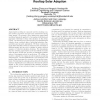Free Online Productivity Tools
i2Speak
i2Symbol
i2OCR
iTex2Img
iWeb2Print
iWeb2Shot
i2Type
iPdf2Split
iPdf2Merge
i2Bopomofo
i2Arabic
i2Style
i2Image
i2PDF
iLatex2Rtf
Sci2ools
ATAL
2015
Springer
2015
Springer
Data-Driven Agent-Based Modeling, with Application to Rooftop Solar Adoption
Agent-based modeling is commonly used for studying complex system properties emergent from interactions among many agents. We present a novel data-driven agent-based modeling framework applied to forecasting individual and aggregate residential rooftop solar adoption in San Diego county. Our first step is to learn a model of individual agent behavior from combined data of individual adoption characteristics and property assessment. We then construct an agent-based simulation with the learned model embedded in artificial agents, and proceed to validate it using a holdout sequence of collective adoption decisions. We demonstrate that the resulting agent-based model successfully forecasts solar adoption trends and provides a meaningful quantification of uncertainty about its predictions. We utilize our model to optimize two classes of policies aimed at spurring solar adoption: one that subsidizes the cost of adoption, and another that gives away free systems to low-income households. ...
| Added | 16 Apr 2016 |
| Updated | 16 Apr 2016 |
| Type | Journal |
| Year | 2015 |
| Where | ATAL |
| Authors | Haifeng Zhang, Yevgeniy Vorobeychik, Joshua Letchford, Kiran Lakkaraju |
Comments (0)

